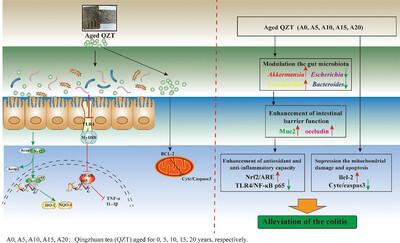陈年青专茶缓解dss诱导结肠炎的化学基础及分子机制
IF 4.5
2区 农林科学
Q1 FOOD SCIENCE & TECHNOLOGY
引用次数: 0
摘要
范围:炎症性肠病(IBD)严重威胁人类健康。清茶,尤其是陈年清茶,被认为具有预防结肠炎的潜在作用。在本研究中,我们旨在评估不同陈年青罐茶对缓解由 DSS 诱导的结肠炎的可行性。方法和结果:通过建立结肠炎动物模型和细胞炎症模型,对不同陈年的 QZT 的功效进行了全面研究。结果表明,0-20 年的 QZT 能明显缓解结肠炎的症状。值得注意的是,龄期为 5 年(A5)和 10 年(A10)的 QZT 通过抑制 NF-κB p65 通路的激活和上调 Nrf2/ARE 通路的表达,在降低促炎细胞因子水平方面特别有效。另外,A10 还能上调肠道微生物群(包括 Allobaculum 和 Lactobacillus),并能有效缓解线粒体损伤,这可能是 A10 在缓解结肠炎方面比 A0 表现出更好活性的机制。结论我们的研究凸显了 QZT(尤其是 A5 和 A10)的潜力,并为开发针对结肠炎的功能食品提供了宝贵的见解。本文章由计算机程序翻译,如有差异,请以英文原文为准。

Chemical Basis and Molecular Mechanism of Aged Qingzhuan Tea Alleviating DSS-Induced Colitis
Scope: Inflammatory bowel disease (IBD) poses a serious threat to human health. Qingzhuan tea (QZT), especially aged QZT, was concerned to have a potential effect on the prevention of colitis. In this study, we aim to assess the feasibility of different aged QZT on the alleviation of colitis induced by DSS. Methods and results: A comprehensive investigation into the efficacy of QZT of different aging years was conducted by establishing the animal model of colitis and the cellular inflammation model. The results demonstrated that QZT aged 0–20 years could significantly alleviate the symptoms of colitis. Notably, QZT aged for 5 years (A5) and 10 years (A10) was particularly effective in downregulating the levels of proinflammatory cytokines, via suppressing the activation of the NF-κB p65 pathway and upregulating the expression of the Nrf2/ARE pathway. The additional upregulation of gut microbiota including Allobaculum and Lactobacillus and superior alleviation on mitochondrial damage may be the mechanisms for A10 to show the better activity than A0 on alleviating colitis. Conclusion: Our study highlights the potential of QZT, especially A5 and A10, and provides valuable insights for the development of functional foods targeting colitis.
求助全文
通过发布文献求助,成功后即可免费获取论文全文。
去求助
来源期刊

Molecular Nutrition & Food Research
工程技术-食品科技
CiteScore
8.70
自引率
1.90%
发文量
250
审稿时长
1.7 months
期刊介绍:
Molecular Nutrition & Food Research is a primary research journal devoted to health, safety and all aspects of molecular nutrition such as nutritional biochemistry, nutrigenomics and metabolomics aiming to link the information arising from related disciplines:
Bioactivity: Nutritional and medical effects of food constituents including bioavailability and kinetics.
Immunology: Understanding the interactions of food and the immune system.
Microbiology: Food spoilage, food pathogens, chemical and physical approaches of fermented foods and novel microbial processes.
Chemistry: Isolation and analysis of bioactive food ingredients while considering environmental aspects.
 求助内容:
求助内容: 应助结果提醒方式:
应助结果提醒方式:


